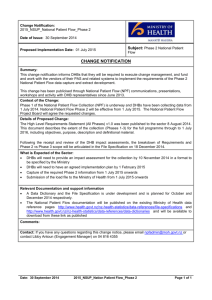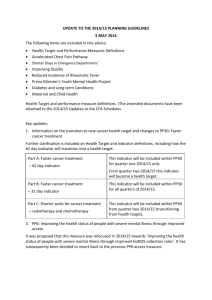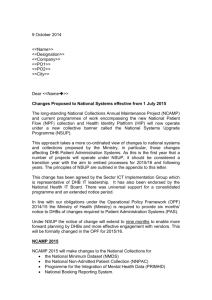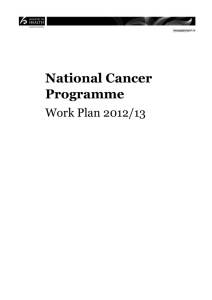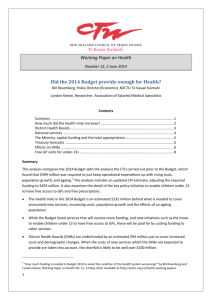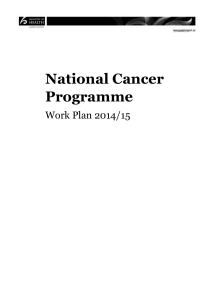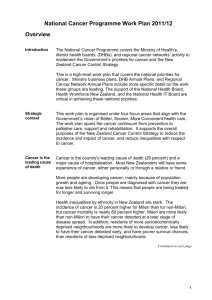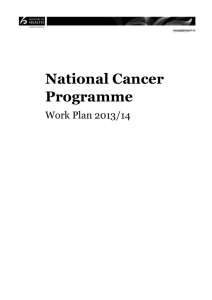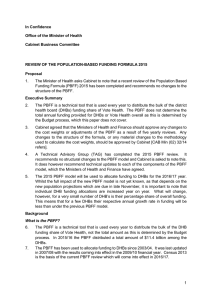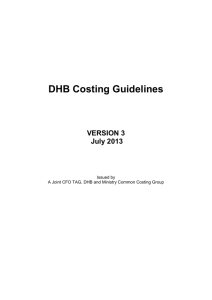Water Supply Registration
advertisement
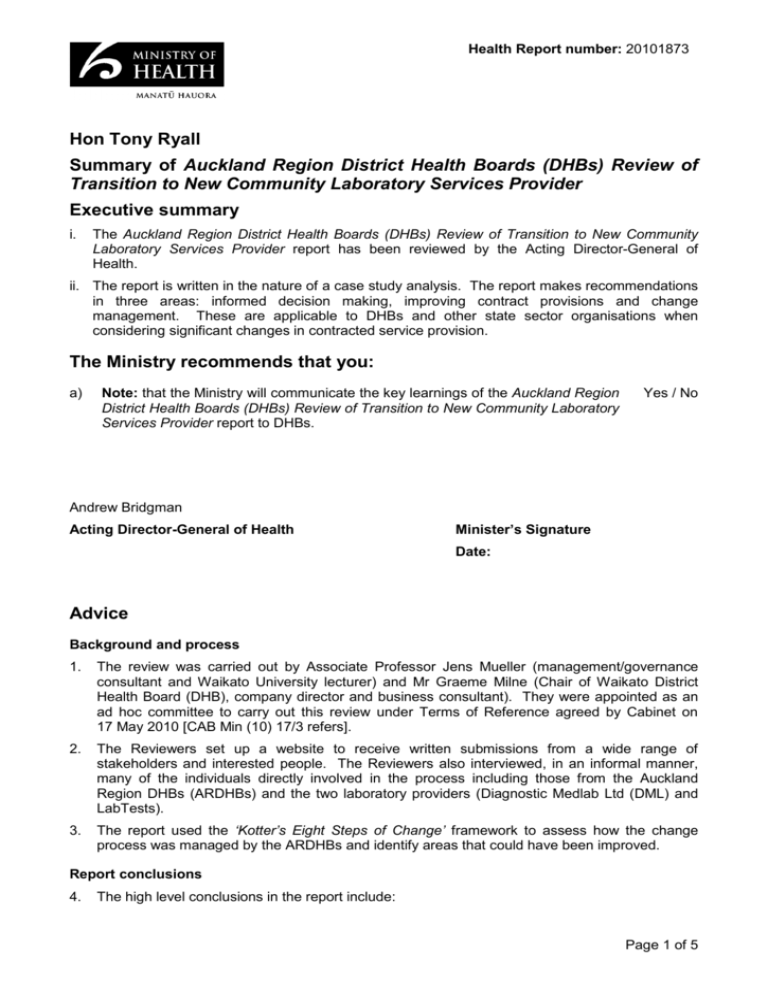
Health Report number: 20101873 Hon Tony Ryall Summary of Auckland Region District Health Boards (DHBs) Review of Transition to New Community Laboratory Services Provider Executive summary i. The Auckland Region District Health Boards (DHBs) Review of Transition to New Community Laboratory Services Provider report has been reviewed by the Acting Director-General of Health. ii. The report is written in the nature of a case study analysis. The report makes recommendations in three areas: informed decision making, improving contract provisions and change management. These are applicable to DHBs and other state sector organisations when considering significant changes in contracted service provision. The Ministry recommends that you: a) Note: that the Ministry will communicate the key learnings of the Auckland Region District Health Boards (DHBs) Review of Transition to New Community Laboratory Services Provider report to DHBs. Yes / No Andrew Bridgman Acting Director-General of Health Minister’s Signature Date: Advice Background and process 1. The review was carried out by Associate Professor Jens Mueller (management/governance consultant and Waikato University lecturer) and Mr Graeme Milne (Chair of Waikato District Health Board (DHB), company director and business consultant). They were appointed as an ad hoc committee to carry out this review under Terms of Reference agreed by Cabinet on 17 May 2010 [CAB Min (10) 17/3 refers]. 2. The Reviewers set up a website to receive written submissions from a wide range of stakeholders and interested people. The Reviewers also interviewed, in an informal manner, many of the individuals directly involved in the process including those from the Auckland Region DHBs (ARDHBs) and the two laboratory providers (Diagnostic Medlab Ltd (DML) and LabTests). 3. The report used the ‘Kotter’s Eight Steps of Change’ framework to assess how the change process was managed by the ARDHBs and identify areas that could have been improved. Report conclusions 4. The high level conclusions in the report include: Page 1 of 5 Health Report number: 20101873 there was insufficient early senior management involvement clinical leadership and oversight was not present at the outset decisions were based on short to mid-term financial considerations and lacked a long-term approach there was a lack of appreciation for the complexity involved in the transition. Report recommendations 5. The recommendations below are the main learnings that can be applied to major procurement projects in general. The Ministry will communicate these to DHBs. a. ‘Contracting decisions with far-reaching impacts, either financially or in terms of stakeholder relationships, require senior management leadership and must be based on extensive factual knowledge of the subject matter. If that expertise is not available inhouse, it must be secured externally. This should not deter DHBs from making complex changes to their operation, but safeguard it against failures during implementation.’ This first recommendation seeks to improve decision-making regarding significant contracted service provision. The initial stages in planning for outsourced service provision need to be well informed by experts; this includes clinical experts that may need to be resourced externally to ensure a robust and objective rationale underpins decisions. b. ‘Provider contracts can no longer be based on ‘expected good faith’ behaviour of any party but must include effective and enforceable provisions under which the DHBs can hold parties accountable for their performance, or lack thereof. This must include specifics of end-of-contract/transition behaviour for any outgoing provider.’ The second recommendation focuses on improving the quality of contract drafting to effectively mange performance delivery and avoidance of contract termination problems. DHBs need to reflect better performance characteristics in their contract documents by which they can ensure delivery matches the DHB’s expectations; this includes measurement, monitoring, and enforcement provisions. Contracts also have to specify the DHB’s expectations regarding end of contract actions. c. ‘Changes in service provisioning that affect a wide group of stakeholders must be anchored in a coherent and well-communicated long-term strategy and not solely rely on short-term financial parameters.’ The last recommendation deals with general change management at the initial planning stage. As with other organisations, DHBs need to base substantive changes that affect a wide group of stakeholders on well informed long term plans. The Ministry would suggest that plans are not only well-communicated but undergo meaningful consultation initially, to ensure compliance with ensuing decisions and eventual implementation. Ministry consultation guidelines for DHBs are currently being reviewed by the Ministry and a revised set of guidelines is expected to be released in early 2011. Comment 6. The review is a useful analysis of how the community pathology service transition took place in 2009 for the three Auckland regional DHBs. The transition encountered substantive problems, from the point of initial decision-making and publicity when the decision to change to new provider Labtests was first announced in 2006. The transition at the end of 2009 was difficult and raised quality and safety issues that resulted in 10 percent of the contract being returned DML. Page 2 of 5 Health Report number: 20101873 7. The report identifies factors contributing to the lack of transition success that occurred at different stages along the change process. Based on these observations, the report concludes that problems were present at the outset (ie, there was insufficient clinical and senior management leadership and oversight). Further, the decision-makers lacked the necessary expertise to inform their decisions, anticipate the complexities and effectively address challenges presented by the change. The contract drafting also was identified as contributing to the transition implementation problems. 8. The report makes recommendations in three areas: informed decision-making, improving contract provisions and change management. The recommendations are applicable to any substantive changes in contracted service provision by State sector organisations. The recommendations reflect the change from a less formal, trust-based contracting environment to the current more formal commercial environment. 9. Learnings from the report will be integrated into NHB advice to DHBs by the Planning and Analysis team. The Ministry will also forward the report to Health Benefits Ltd, for them to draw on the report’s recommendations as they begin to operate in a shared services environment. Minister’s feedback Quality of advice Writing style Quality of analysis Completeness of information Very poor 1 1 1 1 Poor 2 2 2 2 Neutral 3 3 3 3 Good 4 4 4 4 Very Good 5 5 5 5 Minister’s comments: END. Page 3 of 5
